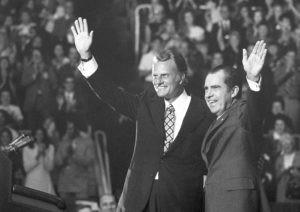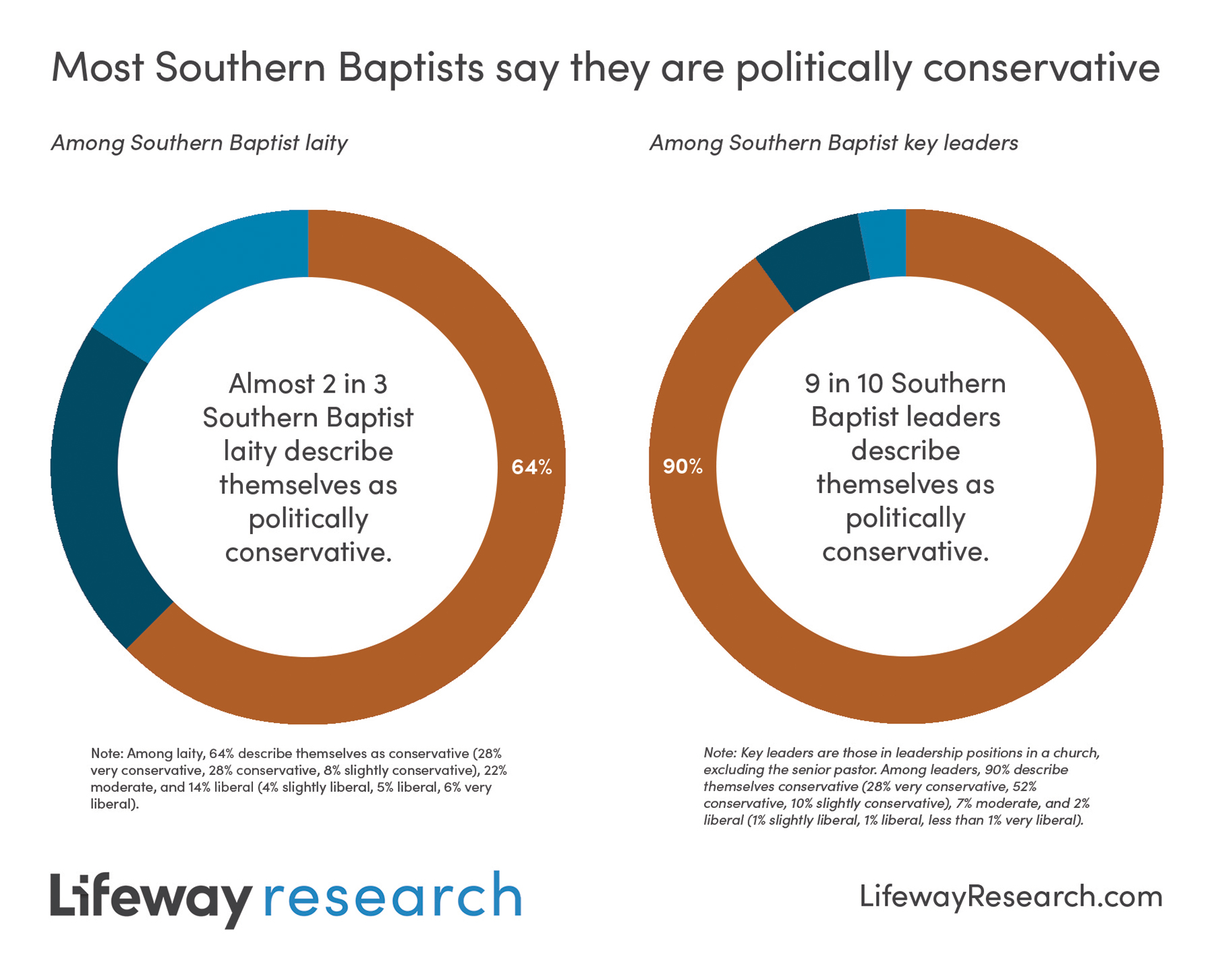The question of whether Southern Baptists should be counted among the nation’s conservative evangelicals is not a new one, but it is up for debate again thanks to results from a new Lifeway Research survey on faith and politics.
That survey found some key differences between Southern Baptist pastors and laity compared to other broadly defined evangelicals.
Who’s an evangelical?
For most of the 20th century, Southern Baptists did not consider themselves “evangelicals” in the same way nondenominational Christians and some Pentecostals did. That was true, in part, because as the nation’s largest Protestant denomination, Southern Baptists didn’t need any other affinity group.
Most expressions of evangelicalism operated outside denominational structures — creating what came to be known as parachurch groups — even though some shared the same lower-case “baptist” ancestry. Thus, you could have Jerry Falwell and John MacArthur operating as evangelical influencers outside the Southern Baptist Convention.

Evangelist Billy Graham and President Nixon wave to a crowd of 12,500 at ceremonies honoring Graham at Charlotte, N.C., on Friday, Oct. 16, 1971. (AP Photo)
Perhaps the best-known evangelical in the 20th century was Billy Graham, who was technically a Southern Baptist but not really. The famed evangelist lived in North Carolina and was on the membership roll at First Baptist Church of Dallas. But no one thought of Graham as a true Southern Baptist.
Southern Baptists declined to join the National Association of Evangelicals when it formed in 1943. And in 2016 when a respected Southern Baptist missiologist suggested it was time for the SBC to be part of the NAE, the proposal went nowhere.
The Reagan Revolution
Things began to change around 1980, though, when the “conservative resurgence” started sweeping the SBC. That also was the year of the Reagan Revolution that married evangelicals with the Republican Party.
Jimmy Carter, after all, was the most evangelistic president America ever had elected. He was a Southern Baptist who believed in personal salvation and the command of Jesus to witness to all people — the very definition of evangelism. But he was rejected by his own in his re-election campaign, swept out of office by the barely religious Reagan who rallied conservative Christians to his cause.
From Reagan forward, pollsters began paying attention to a subgroup now dominating headlines: “evangelical voters.” These pollsters use various criteria to determine who counts as an evangelical, and by most of those measures, today’s Southern Baptists would be covered by the label.
That is a big change from 50 years ago, and it was reflected in a Pew Research Center headline from 2021: “Most White Americans Who Regularly Attend Worship Services Voted for Trump in 2020.”
By the age of Trump, the average Southern Baptist had melded into the “evangelical” voting bloc that put Trump in the White House. To outside observers, there was no distinction between Southern Baptists and other evangelicals — despite what the history might have been.
Even the new Lifeway survey finds 58% of Southern Baptist laity and 75% of Southern Baptist leaders identify with the Republican Party. Only 26% of Southern Baptist churchgoers and 7% of leaders say they are Democrats.

New data
Fast forward to 2024, and the SBC’s publishing house recently put out a news release with this opening paragraph: “When it comes to politics, the average Southern Baptist is more likely to agree with historic Baptist teaching than the claims of some self-professed Christian nationalists.”
Study after study has shown evangelical Christians are the driving force behind Christian nationalism — the belief that America was founded as a “Christian nation” and that conservative Christians ought to have the most influence in government.
But now Lifeway Research finds a crack between Southern Baptists and other evangelicals: “Southern Baptists broadly embrace conservative political ideology but also support religious liberty for all Americans and a government that does not favor any specific religion.”
The survey of 500 self-identified Southern Baptist churchgoers and 507 individuals who serve in key leadership positions at Southern Baptist churches (excluding senior pastors) was sponsored by the Land Center for Cultural Engagement at Southwestern Baptist Theological Seminary.

Daniel Darling
That center is led by Daniel Darling, who came to the post from the National Religious Broadcasters.
“These findings reinforce that Baptists in our pews generally hold historic Baptist beliefs about the role of the church and the state,” Darling said. “Baptists desire robust engagement in the public square and strongly believe in a free church in a free state. This research should inform the discussions surrounding Southern Baptists, especially in a political season.”
The separation of church and state is enshrined in America’s founding documents in no small measure because of the influence of Baptists. It was in response to a group of Baptists that Thomas Jefferson first penned the phrase “wall of separation.”
Until recent times, Baptists of all kinds — including Southern Baptists — were champions of religious liberty for all. However, the SBC in its new conservative form broke with the best-known champion of religious liberty for all, the Baptist Joint Committee for Religious Liberty.

A return to form?
Lately, many a Southern Baptist leader — take Al Mohler of Southern Baptist Theological Seminary as an example — has sounded a lot like a garden-variety Christian nationalist. Which is why the latest data from Lifeway bears either scrutiny or skepticism.
The Lifeway news release continued: “Most Southern Baptists view the relationship between the church and state more like early Baptists than modern-day Christian nationalists. Those at Southern Baptist churches value religious liberty for all Americans and aren’t as supportive of establishing Christianity as a preferred religion within the U.S.”
Key findings:
- 58% of members and 62% of leaders say the government should not favor any specific religion or religious belief, while 36% of members and 33% of leaders say the government should favor Christianity.
- 92% of laity and 95% of key leaders believe religious liberty should apply to all people and religions.
- 66% of members and 75% of leaders do not believe religious liberty is a principle that should only advance the Christian faith.
- 81% of laity and 85% of leaders say the government should not give one religion preference over another.
- 80% of members and 86% of leaders support the government ensuring people can freely practice their religion, even when this includes “false religions.”
On their face, these statistics defy the stereotype of Southern Baptists as evangelical voters. But there’s more to the story.
“Southern Baptist laity are more divided over privileges afforded to Christianity due to what they see as the faith’s role in the nation’s origins,” Lifeway reported. “More than nine in 10 (91%) say Christianity influenced the founding of the United States. When asked if Christianity deserves special privileges from the American government due to the nation’s history, 51% of Southern Baptists members disagree, while 38% agree.”
The survey’s authors surmise: “Southern Baptist churchgoers may embrace religious freedom in part because most don’t see other religions as threats. Three in five (60%) say the presence of competing religions in a society does not pose a threat to the church and its mission.”
And yet, dig a little deeper and the story changes again.
“Southern Baptists are more likely to advocate for Christian and religious influence in the government,” the report states. “More than two in three members (67%) and three in four leaders (77%) believe Christians should fight secularism by encouraging legislation that encourages Christian beliefs and practices. Laity are more likely than leaders to say loosening U.S. Constitutional prohibitions on government involvement in religion can stem the tide of moral decline (43% v. 29%). Half of leaders (51%) disagree compared to 38% of members. While most in both groups believe every public school should post the Ten Commandments in their buildings, laity are more supportive than leaders (70% v. 57%).”
Related articles:
Americans are not equally divided on culture wars, Robert Jones explains in BNG webinar
How to tell if it’s ‘Christian nationalism’ or not
‘Christian nationalism is more than attitudes; it’s a political dysfunction’
The threat of Christian nationalism in all 50 states, illustrated in eight charts | Analysis by Robert P. Jones
Isn’t it really fundamentalist Christian nationalism? | Opinion by Bill Leonard


